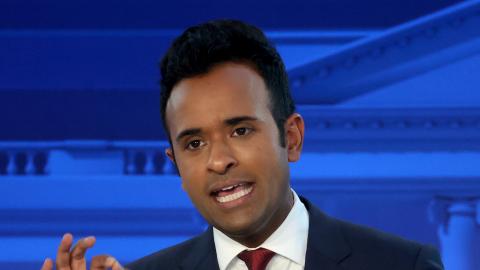With a government shutdown looming as some House Republicans refuse to support even a short-term funding bill that includes Ukraine-war aid, GOP presidential candidate Vivek Ramaswamy has come forward with a solution.
“We need a reasonable peace plan to end this,” he argued standing center stage in Wednesday’s debate.
He claims his plan is modeled on Richard Nixon’s 1972 deal with Mao Zedong.
Under Ramaswamy’s proposal, America would cease its military support to Kyiv, keep Ukraine out of NATO and recognize Russia’s control over the territory it now occupies; in return, Russia would end its “military alliance” with China.
“The strategy is the mirror-image of President Nixon’s diplomatic maneuver that distanced China from Russia in 1972,” Ramaswamy writes, “except this time Putin is the new Mao.”
His strategy certainly aims for Nixonian heights. But instead of pulling Russia toward the West, it would only reinforce today’s no-limits friendship between China and Russia.
This is because his plan overlooks how the relationships among the three powers have changed since Nixon’s time.
The truth is that US diplomatic efforts, rightly praised for their creativity, seized on rather than created last century’s Sino-Soviet split.
By the time Henry Kissinger made his secret trip to China in July 1971, Moscow and Beijing had been at loggerheads for nearly a decade.
In 1969, the two Communist powers even fought a bloody skirmish on their border; a period of high tension ensued, which included Soviet hints of nuclear use against China.
Because Leninist doctrine implies world Communism can have only one leader, Mao sought to supplant the new Soviet leadership after Stalin’s death in 1953 and especially after Khrushchev’s secret speech denouncing Stalin in 1956.
To accomplish this, he tapped into Chinese pride, still wounded over the “century of humiliation” it had suffered at the expense of more advanced nations, including Russia.
Unlike other Communists who had distanced their nations from Moscow — Yugoslavia’s Tito and Albania’s Enver Hoxha — Mao knew China had the size and strength to openly challenge the Soviet Union.
To the extent America did anything to foster the Sino-Soviet split, it did so with sticks rather than with carrots. A now-forgotten crisis from the Eisenhower era illustrates how.
During the 1950s offshore-islands crises, China sought to seize the islands of Quemoy and Matsu in the Taiwan Strait.
After the Eisenhower administration hinted at the use of nuclear weapons, Mao turned to the Soviet Union for backing.
But Moscow, alarmed by the Chinese leader’s apparently cavalier attitude toward nuclear conflict, rebuffed Mao and terminated its support for Beijing’s nuclear-weapons program in 1959.
The Eisenhower administration could have pressured Taiwan to let China take the islands, just as Ramaswamy is urging Ukraine to cede its territory to Russia.
But Dwight Eisenhower chose to stand firm and demonstrated to Beijing that the Soviets were unreliable partners.
Today’s strategic relationship between China and Russia is different from that in the late 1950s and ’60s.
No longer are the two nations in a zero-sum competition for leadership of a global movement that can have only one center.
Instead, they are united by a shared desire to weaken the US-led global order and all its trappings — including the role of the dollar as the preeminent reserve and transaction currency.
Whatever potential rifts exist are mostly hidden beneath the surface. Any “green shoots” of disagreement between Beijing and Moscow will take a long time, and a lot of subtle nurturing, to sprout.
Even if a cease-fire in Ukraine were in place, and even if sanctions on Russia were lifted, Moscow would have no incentive to fundamentally alter its geopolitical orientation.
Just the opposite — the Kremlin would immediately spin any plan that grants Russian President Vladimir Putin territorial gains in eastern and southern Ukraine as a victory and evidence that Russia’s relationship with China, far from being dispensable, was essential to Russian success.
If China’s influence is strong enough to force an agreement that provides Russia with major economic benefits and completely reverses Washington’s orientation in Europe, certainly it is too strong for Russia to reject.
Ramaswamy proposes “a Korean war style armistice agreement that codifies the current lines of control,” but he surely doesn’t mean to station US troops on Ukrainian soil for the next 70 years.
His plan’s prohibition on US arms for Ukraine would mean Moscow could finish the job as soon as it felt powerful enough to do so.
Republicans in Congress would do well to reject Ramaswamy’s plan.
Better the United States continue its support for Ukraine than throw its weight behind a proposal that would highlight China’s value to Russia and spell the end of Ukraine.
















